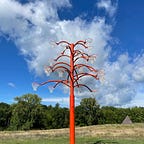9/11: Our Collective Trauma Still Lingers
Like a lot of Americans, I lost my sense of invulnerability on 9/11, shedding yet another vestige of American exceptionalism. I was fortunate not to lose friends, colleagues or loved ones.
All told, about 3,000 people perished on 9/11. Thousands more have died since from health complications, mostly people who participated in rescue, recovery and clean-up efforts. But its legacy is much more complicated and troubling than that. There are many other victims of the attacks and its consequences who aren’t being eulogized or celebrated with patriotic pomp.
The images and memories from that time are seared in my mind, as they are for so many. I see the horrors — the planes, the towers, the flames, the smoke, the ash, the twisted metal, the bodies, the screams, the empty ER rooms. But I also see the goodness — the heroism of first responders, the rescue and recovery efforts, the outpouring of goodwill, generosity and care.
I remember picking up my stunned kids that morning, unable to answer their many questions.
I remember struggling to explain hate, while coming to terms with that hate being directed at me, at us.
I remember struggling to make my kids feel safe, while feeling unsafe myself.
I remember sharing our home with downtown friends as they figured out where else to live.
I remember begging my husband not to travel. Airplanes had become weapons and death traps in my mind. I cried every time he took a trip and didn’t exhale until he returned.
I remember bursting into tears in the street, in the supermarket, on the phone. I never knew what would trigger the tears.
But professionally, 9/11 was perhaps an even bigger blow, on both a micro and macro scale.
A research paper I’d been working on for nearly two years about immigrant legal service provision in the US was released on 9/10. Suffice it to say, many fewer people read it than I had hoped. I was crushed. And legal services really mattered in the aftermath. To make matters even worse, hope for federal immigration reform, which was palpable on 9/10, evaporated the next day. Twenty years later, immigration reform still eludes us and the surveillance and enforcement regime 9/11 ushered in is firmly entrenched. That new regime changed all of our lives, but especially those of Arabs, Middle Easterners, and South Asians living in America or hoping to come to America. Despite religious, cultural, and linguistic differences, they suffered from racial profiling, heightened scrutiny, government surveillance and other forms of oppression, including detention and even torture.
We, but especially they, still feel the effects of the passage of The Uniting and Strengthening America by Providing Appropriate Tools Required to Intercept and Obstruct Terrorism (USA PATRIOT) Act of 2001 and The Homeland Security Act of 2002, which transferred nearly all the functions of the Immigration and Naturalization Service to the newly-created Department of Homeland Security. And the National Security Entry-Exit Registration System (NSEERS), a special registry targeting Muslim men and boys, which registered over 80,000 individuals and deported over 13,000, harkens back to the governmental excesses and “guilt by association” policies that led to the interning of Japanese Americans during World War II. That shameful chapter in our history took decades to understand, rue and eventually atone for, as discussed in this report I wrote in 2002.
The 9/11 attacks cemented a dark narrative about the “other,” about the foreigner as potential terrorist. It fostered a fortress mentality. While these stereotypes and prejudices persist (and were amplified greatly during the Trump administration), they have also found new targets and new sources of oxygen. Hate crimes and discrimination against Asians have surged in the wake of COVID, while other forms of extremism against groups deemed “other” continue. Nativism permeates our political debates about immigrant and refugee policy.
This is the legacy of 9/11 that isn’t discussed nearly enough. The victims of hate narratives and hate crimes, of governmental overreach, of detention and torture belong in this story too.
Traumatic crises like 9/11 are disruptive. But that very disruption creates the potential for transformation. It’s how we respond to them that defines us and shapes that transformation.
9/11 made us hyper-vigilant and suspicious, some might say paranoid. While we initially united in solidarity, we ultimately settled into revenge, blame and scapegoating. We created massive new bureaucracies and entered long military entanglements at a heavy cost to our soldiers and the American taxpayer.
Alas, 2021 finds us much more distrustful, tribal and polarized than we ever were in 2001. And that scares me even more than a terrorist attack or a pandemic.
